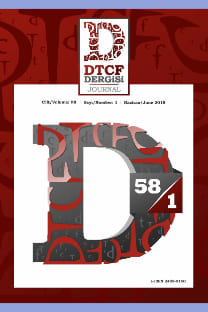SÖMÜRGECİLİKSONRASI DÖNEM ROMANLARINDA YABANCILAŞMA UNSURUNUN TEMSİLİ: SALMAN RUSHDIE'NİN UTANÇ VE JANET FRAME'İN 1 BİR BAŞKA YAZA DOĞRU ROMANLARI
THE REPRESENTATIONS OF ALIENATION IN POSTCOLONIAL NOVELS: SHAME BY SALMAN RUSHDIE AND TOWARDS ANOTHER SUMMER BY JANET FRAME
___
- Ahmad, Aijaz. “Jameson’s Rhetoric of Otherness and the “National Allegory”.” Social Text No. 17. (1987): 3-25.
- ---. “Orientalism and After: Ambivalence and Cosmopolitan Location in the Work of Edward Said.” Economic and Political Weekly 27.30 (1992): PE98-PE116.
- Barry, Peter. Beginning Theory: An Introduction to Literary and Cultural Theory. USA: Manchester University Press, 2002.
- Boehmer, Elleke. Colonial and Postcolonial Literature. New York: Oxford Oxford University Press, 2005.
- Brontë, Charlotte. Jane Eyre. Çev. Arzu Altınat. İstanbul: Yabancı, 2017. Çelikel, Mehmet Ali. Sömürgecilik Sonrası İngiliz Romanında Kültür ve Kimlik. İstanbul: Bilge Kültür Sanat, 2011.
- Ege Uygur, Ufuk. Batı Kültüründe Yabancılaşma Kuramları ve David Storey’nin Romanlarında Yabancılaşma Teması. Ankara: Ankara Üniversitesi Dil ve Tarih-Coğrafya Fakültesi, 2000.
- Fieldhouse, David Kenneth. Colonialism 1870-1945: An Introduction. London and Basingstoke: The Macmillan Press, 1983.
- Forster, Edward Morgan. A Passage to India. London: Penguin, 1979.
- Frame, Janet. Bir Başka Yaza Doğru. Çev. Z. Ceyil Özmen. İstanbul: Yapı Kredi, 2010.
- Hailwood, Simon. Alienation and Nature in Environmental Philosophy. United Kingdom: Cambridge University Press, 2015.
- Innes, Catherine Lynette. The Cambridge Introduction to Postcolonial Literatures in English. New York: Cambridge University Press, 2007.
- Jaeggi, Rahel. Alienation. New York: Columbia University Press, 2014.
- Kalekin-Fishman, Devorah. “Studying Alienation: Toward a Better Society?” Kybernetes 35. 3-4 (2006): 522-530.
- MacQueen, Norrie. Colonialism. Great Britain: Pearson Longman, 2007.
- McLeod, John. Beginning Postcolonialism. Manchester and New York: Manchester University Press, 2000.
- Parry, Benita. “The Postcolonial: Conceptual Category or Chimera?” The Yearbook of English Studies 27, The Politics of Postcolonial Criticism, 1997. 3-21.
- Rushdie, Salman. Utanç. Çev. Aslı Biçen. İstanbul: Can, 2013.
- Spivak, Gayatri Chakravorty. “Can the Subaltern Speak?”. Colonial Discourse and Post-colonial Theory. Ed. Patrick Williams and Laura Chisman. New York: Columbia University Press, 1994. 66-111.
- Talib, Ismail S. The Language of Postcolonial Literatures An Introduction. London and New York: Routledge, 2002.
- Watson, Irene. Aboriginal Peoples, Colonialism and International Law. New York: Routledge, 2015.
- ISSN: 0378-2905
- Yayın Aralığı: 2
- Başlangıç: 1942
- Yayıncı: Ankara Üniversitesi Dil ve Tarih-Coğrafya Fakültesi
SELÇUKLU DEVLETİNİN YADİGÂRI CELALİ KALESİ
GEOFFREY CHAUCER'IN TROLIUS VE CRISEYDE ESERİNDE KÜLTÜRÖTESİLİK
TRİANON ANTLAŞMASI VE MACAR ŞİİRİNE YANSIMALARI
ULUSAL STRATEJİLER ÇERÇEVESİNDE BİRLİKTE ÇALIŞABİLİRLİK EYLEMLERİNİN DEĞERLENDİRİLMESİ
SAİME ÖZLEM GÖKKURT DEMİRTEL, Hakan DEMİRTEL
THE 'GOTHIC' IN HAMLET: THE ROLE OF THE MACABRE IN CREATING CATHARTIC HORROR1
GIUSEPPE TOMASI DI LAMPEDUSA VE "IL GATTOPARDO" DA YAŞAM, ÖLÜM VE SONSUZLUK ARZUSU
MİTHAT BAVER ZENCİR, LEVENT KUTLUTÜRK, FATOŞ SUBAŞIOĞLU
İLKOKUL, ORTAOKUL VE LİSE ÖĞRENCİLERİNDE ULAMSAL ÖRGÜTLEME ÇERÇEVESİNDE TAKSONOMİK FARKINDALIK
ONDALIK KESİRLERİN OSMANLI MUHASEBE MATEMATİĞİ ESERLERİNDEKİ YERİ (15-17. YÜZYIL)
